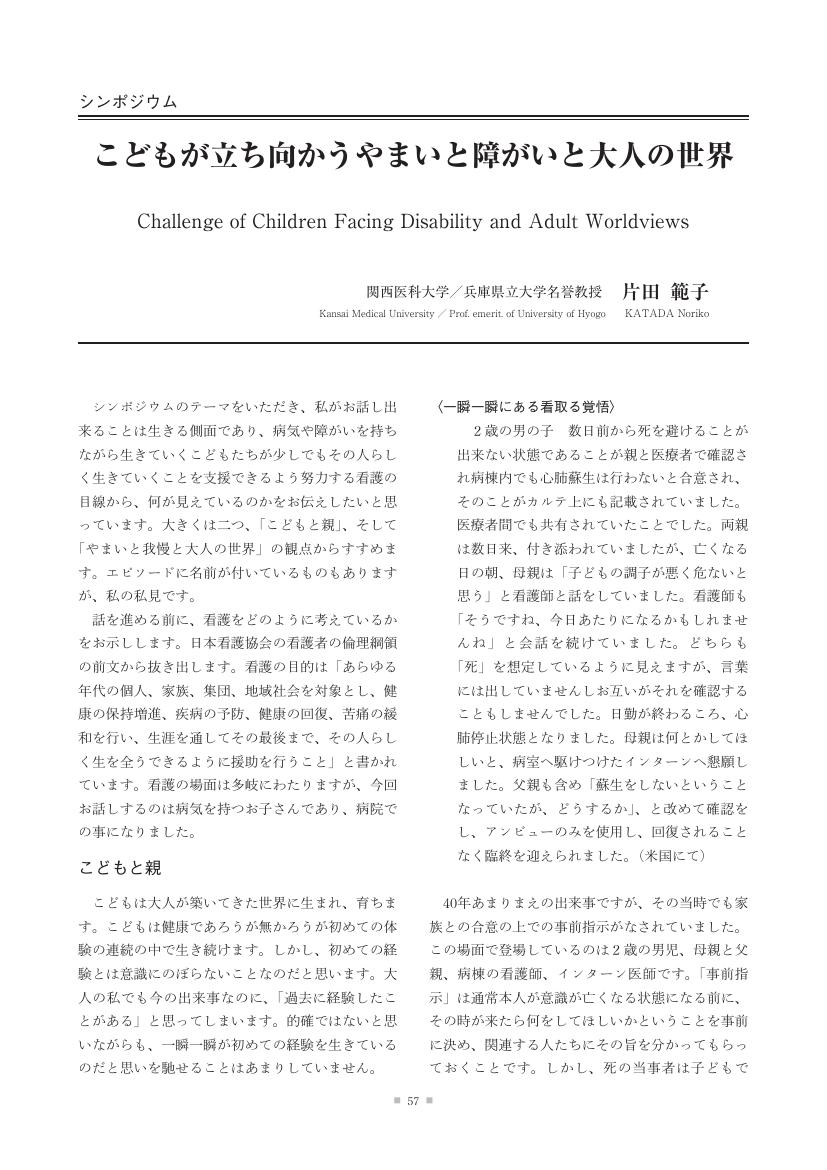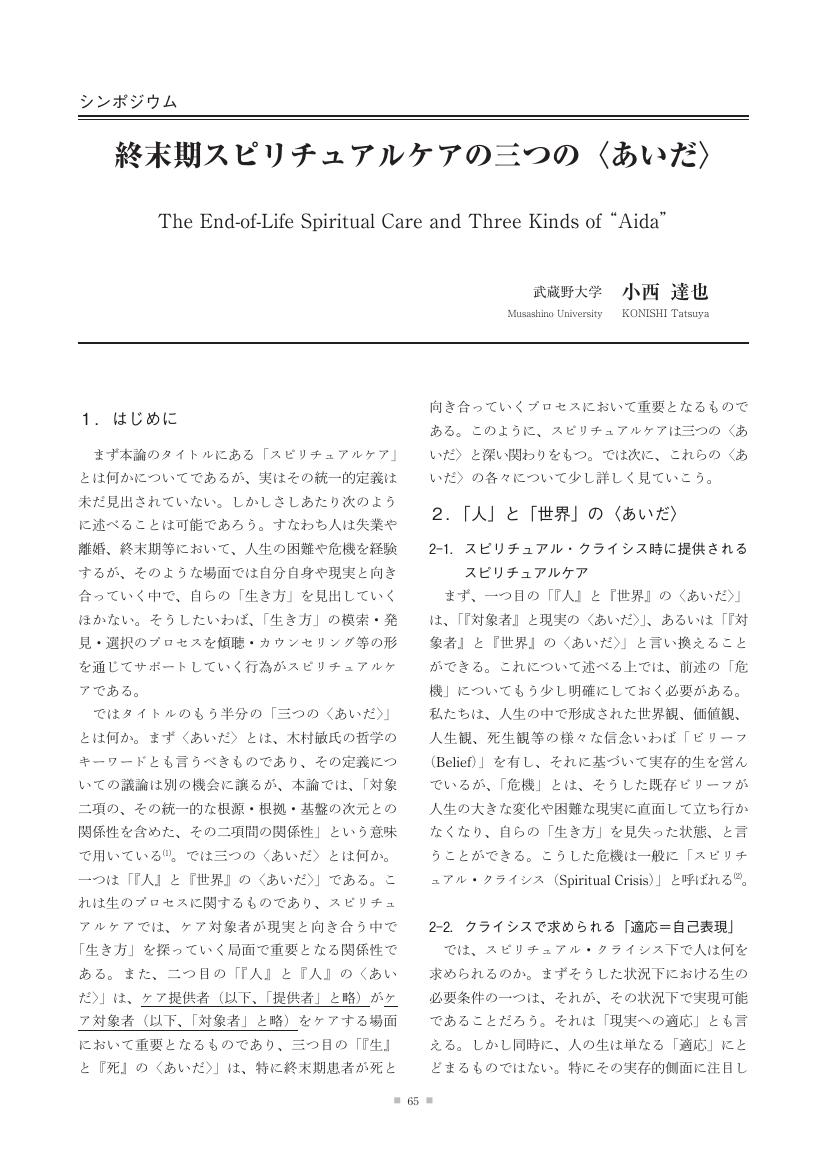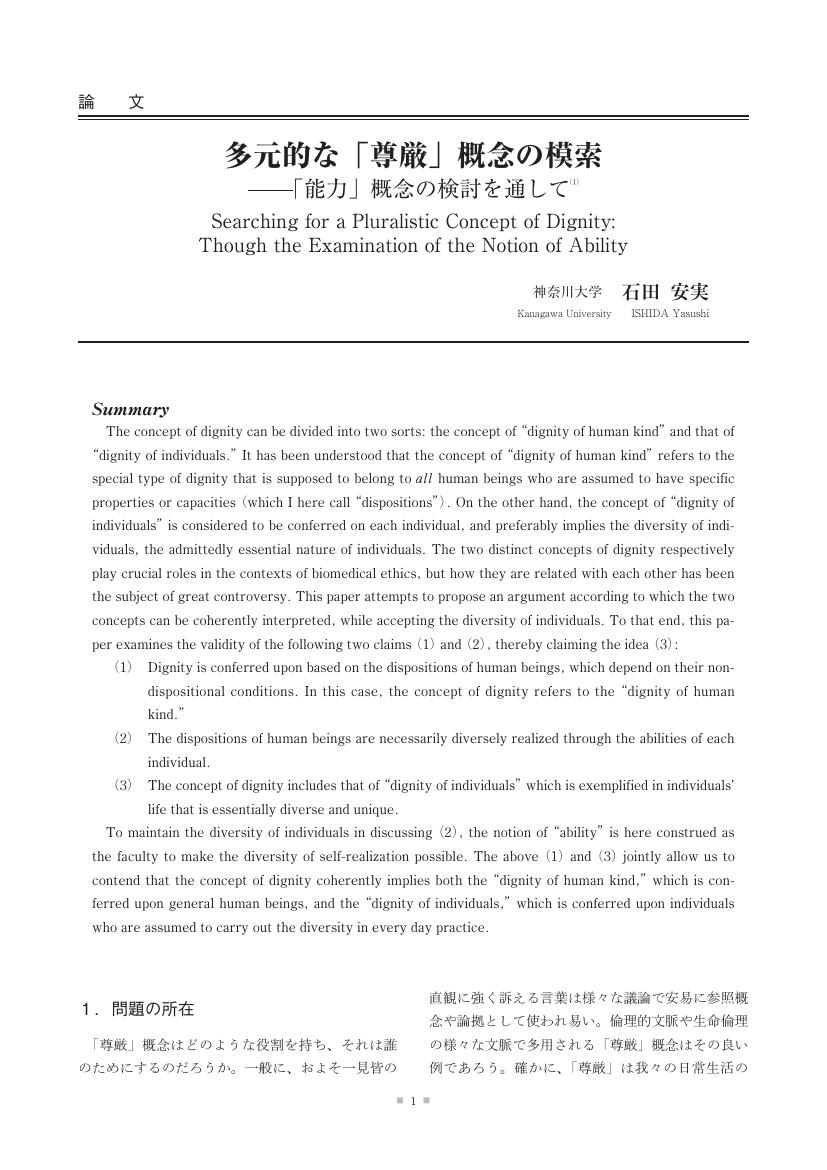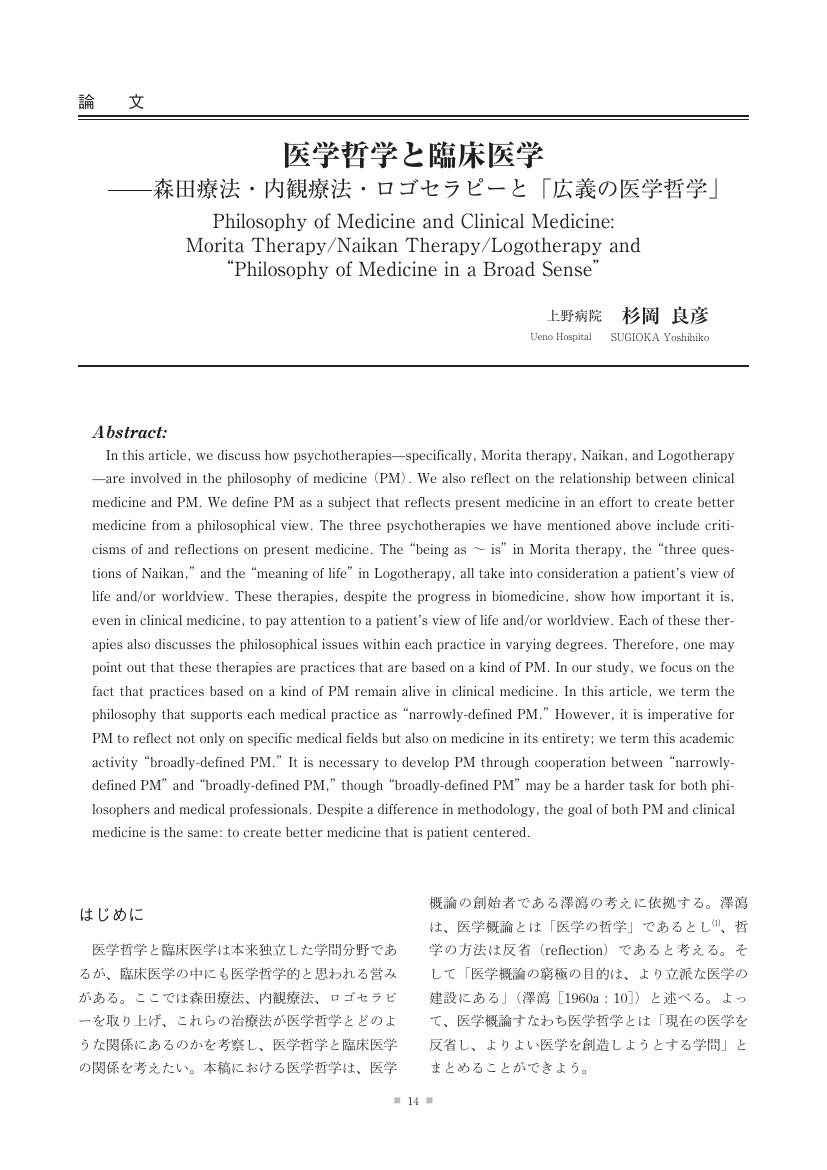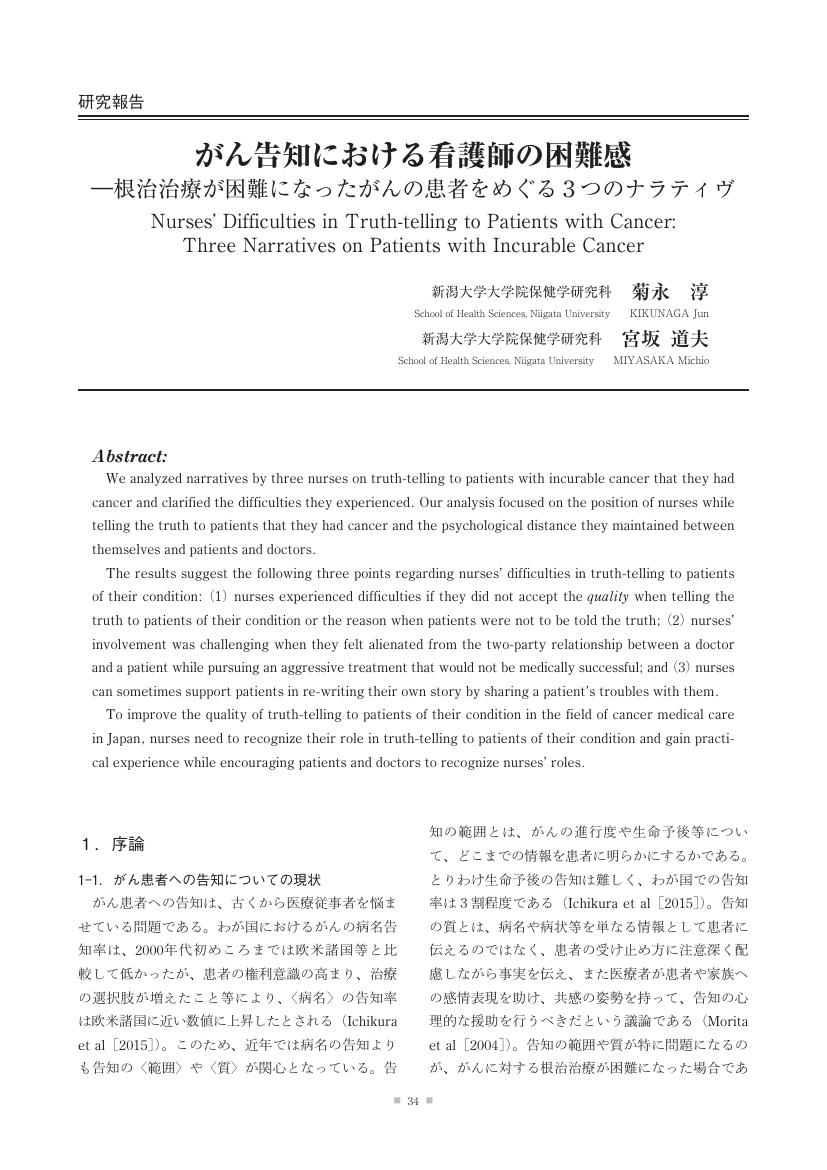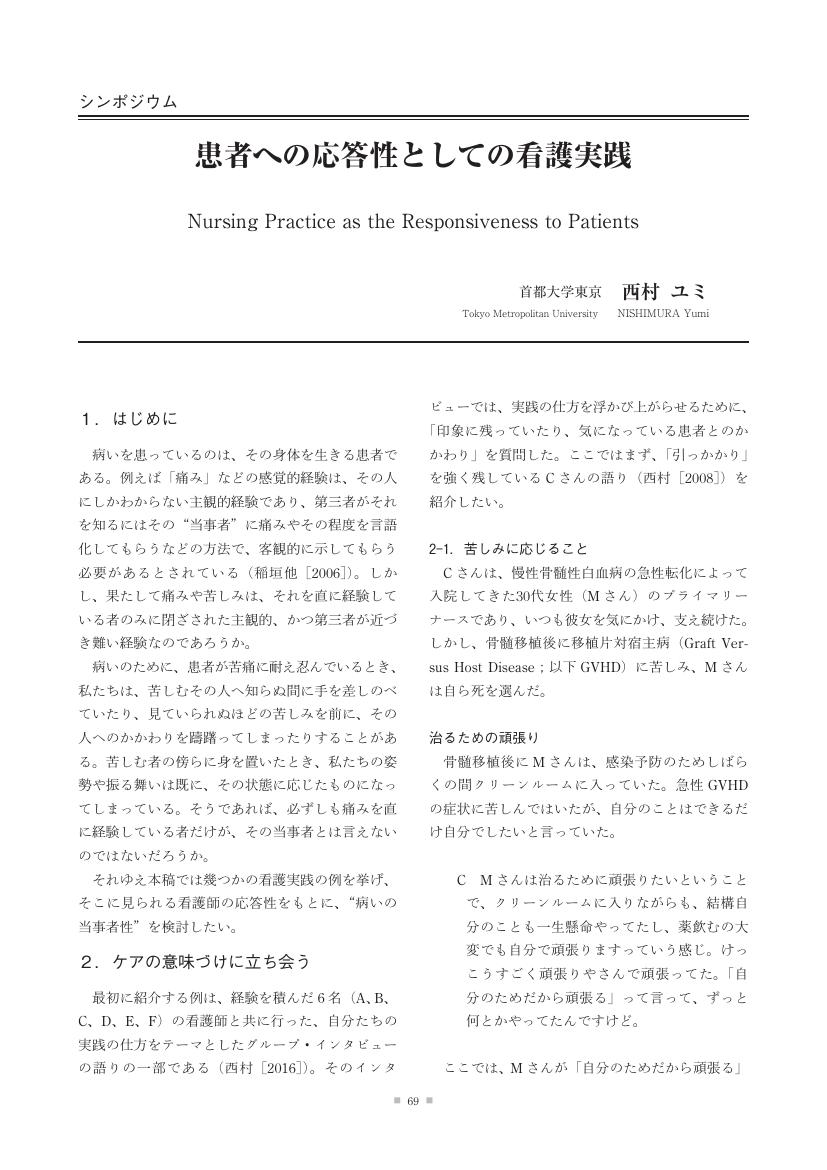- 著者
- 澤田 愛子
- 出版者
- 日本医学哲学・倫理学会
- 雑誌
- 医学哲学 医学倫理 (ISSN:02896427)
- 巻号頁・発行日
- vol.22, pp.119-121, 2004
1 0 0 0 人工妊娠中絶に関する倫理の諸問題
- 著者
- 澤田 愛子
- 出版者
- 日本医学哲学・倫理学会
- 雑誌
- 医学哲学 医学倫理 (ISSN:02896427)
- 巻号頁・発行日
- vol.3, pp.71-82, 1985
1 0 0 0 人間はいつ死ぬのか : 死の再定義・判定を巡る諸問題
- 著者
- 澤田 愛子
- 出版者
- 日本医学哲学・倫理学会
- 雑誌
- 医学哲学 医学倫理 (ISSN:02896427)
- 巻号頁・発行日
- vol.8, pp.35-51, 1990
Today's marvellous medical advances confront us with a verysevere problem, namely the criteria for establishing death, such as brain death. Technical advances in medicine now permit maintenance of cardiac and respiratory functions in human beings for a few days after massive or total destruction of the brain. This fact has presented us with delicate and difficult problems, especially in relation to organ transplantation. Namely, when a human being's brain functions are lost irreversibly and yet his cardiac and respiratory functions are maintained by an artificial life-support system, does he live or not? Up to now the signs of life have been seen as vital signs (body temperature, pulse, respiratory rate and blood pressure etc.). But if these signs are maintained by artificial methods, are they truly vital signs? Physicians say that even if a life-support system works, cardiac function will stop in a few days or a few weeks. But this short term is quite important for organ transplantation. At that time each organ except the brain is maintained through artificial circulation of blood. Therefore physicians who agree to organ transplantation stress that brain death is the true death of human beings, for the purpose of legal removal of organs. But many ordinary people have complex feelings about it. They don't easily admit a family member's brain death because of their warm pink bodies. Here we have a severe problem. In this article I have focussed on these problems and have tried to think of the redefinition of death in modern society from different perspectives, that is, philosophically, psychologically, medically, culturally and legally. And finally in conclusion my thoughts are presented.
1 0 0 0 OA こどもが立ち向かうやまいと障がいと大人の世界
- 著者
- 片田 範子
- 出版者
- 日本医学哲学・倫理学会
- 雑誌
- 医学哲学 医学倫理 (ISSN:02896427)
- 巻号頁・発行日
- vol.35, pp.57, 2017 (Released:2018-06-20)
1 0 0 0 OA 終末期スピリチュアルケアの三つの〈あいだ〉
- 著者
- 小西 達也
- 出版者
- 日本医学哲学・倫理学会
- 雑誌
- 医学哲学 医学倫理 (ISSN:02896427)
- 巻号頁・発行日
- vol.35, pp.65, 2017 (Released:2018-06-20)
1 0 0 0 OA 自閉スペクトラム症当事者(との共同)研究をめぐって
- 著者
- 清水 光恵
- 出版者
- 日本医学哲学・倫理学会
- 雑誌
- 医学哲学 医学倫理 (ISSN:02896427)
- 巻号頁・発行日
- vol.35, pp.71, 2017 (Released:2018-06-20)
1 0 0 0 OA 多元的な「尊厳」概念の模索 「能力」概念の検討を通して
- 著者
- 石田 安実
- 出版者
- 日本医学哲学・倫理学会
- 雑誌
- 医学哲学 医学倫理 (ISSN:02896427)
- 巻号頁・発行日
- vol.35, pp.1, 2017 (Released:2018-06-20)
1 0 0 0 OA 医学哲学と臨床医学 森田療法・内観療法・ロゴセラピーと「講義の医学哲学」
- 著者
- 杉岡 良彦
- 出版者
- 日本医学哲学・倫理学会
- 雑誌
- 医学哲学 医学倫理 (ISSN:02896427)
- 巻号頁・発行日
- vol.35, pp.14, 2017 (Released:2018-06-20)
1 0 0 0 OA がん告知における看護師の困難感 根治治療が困難になったがんの患者をめぐる3つのナラティヴ
- 著者
- 菊永 淳 宮坂 道夫
- 出版者
- 日本医学哲学・倫理学会
- 雑誌
- 医学哲学 医学倫理 (ISSN:02896427)
- 巻号頁・発行日
- vol.35, pp.35, 2017 (Released:2018-06-20)
1 0 0 0 OA 誕生と死の〈あいだ〉を生きる人間 〈シンポジウムのまとめ〉
- 著者
- 丸橋 裕
- 出版者
- 日本医学哲学・倫理学会
- 雑誌
- 医学哲学 医学倫理 (ISSN:02896427)
- 巻号頁・発行日
- vol.35, pp.49, 2017 (Released:2018-06-20)
1 0 0 0 OA 災害時における調査研究の実施体制
- 著者
- 飯島 祥彦
- 出版者
- 日本医学哲学・倫理学会
- 雑誌
- 医学哲学 医学倫理 (ISSN:02896427)
- 巻号頁・発行日
- vol.34, pp.43, 2016 (Released:2018-05-07)
1 0 0 0 OA がん闘病記の社会学 患者の声を聴く
- 著者
- 門林 通子
- 出版者
- 日本医学哲学・倫理学会
- 雑誌
- 医学哲学 医学倫理 (ISSN:02896427)
- 巻号頁・発行日
- vol.34, pp.59, 2016 (Released:2018-05-07)
1 0 0 0 OA 人間同士の出会いから生まれる「いのち」は生死を貫いて
- 著者
- 細井 順
- 出版者
- 日本医学哲学・倫理学会
- 雑誌
- 医学哲学 医学倫理 (ISSN:02896427)
- 巻号頁・発行日
- vol.34, pp.64, 2016 (Released:2018-05-07)
1 0 0 0 OA 患者への応答性としての看護実践
- 著者
- 西村 ユミ
- 出版者
- 日本医学哲学・倫理学会
- 雑誌
- 医学哲学 医学倫理 (ISSN:02896427)
- 巻号頁・発行日
- vol.34, pp.69, 2016 (Released:2018-05-07)
1 0 0 0 OA 医学研究の倫理審査委員会における非医学系倫理委員の意義と役割
- 著者
- 瀬戸山 晃一
- 出版者
- 日本医学哲学・倫理学会
- 雑誌
- 医学哲学 医学倫理 (ISSN:02896427)
- 巻号頁・発行日
- vol.34, pp.79, 2016 (Released:2018-05-07)
- 出版者
- 日本医学哲学・倫理学会
- 雑誌
- 医学哲学 医学倫理 (ISSN:02896427)
- 巻号頁・発行日
- vol.33, pp.97-104, 2015-09-30 (Released:2018-02-01)
1 0 0 0 OA 精神医学が考慮するべき「第3のペイン」 臨死期の患者における脳の機能障害による苦痛
- 著者
- 新山 喜嗣
- 出版者
- 日本医学哲学・倫理学会
- 雑誌
- 医学哲学 医学倫理 (ISSN:02896427)
- 巻号頁・発行日
- vol.34, pp.1-10, 2016 (Released:2018-05-07)
1 0 0 0 OA 記憶障害 高次脳機能障害者の手記の解釈
- 著者
- 中野 桂子
- 出版者
- 日本医学哲学・倫理学会
- 雑誌
- 医学哲学 医学倫理 (ISSN:02896427)
- 巻号頁・発行日
- vol.34, pp.11-21, 2016 (Released:2018-05-07)
1 0 0 0 OA リーン・ラダー・ベイカーの構成説における人間の概念分析・
- 著者
- 峯村 優一
- 出版者
- 日本医学哲学・倫理学会
- 雑誌
- 医学哲学 医学倫理 (ISSN:02896427)
- 巻号頁・発行日
- vol.34, pp.22-31, 2016 (Released:2018-05-07)
1 0 0 0 OA 「先制医療」の理論的構造について
- 著者
- 村岡 潔
- 出版者
- 日本医学哲学・倫理学会
- 雑誌
- 医学哲学 医学倫理 (ISSN:02896427)
- 巻号頁・発行日
- vol.33, pp.52-58, 2015-09-30 (Released:2018-02-01)
Recently, a modern medical strategy has been proposed in Japan. It is called "Preemptive Medicine." This paper described the main features of "Preemptive Medicine" and its theoretical framework from the medical philosophy viewpoint. First, I examined a definition and concept of "Preemptive Medicine." This medical strategy presents a preemptive intervention for persons at risk to become ill in the near future. Risk prediction depends on presymptomatic tests like genetic testing that could reveal hereditary characteristics and other possible biomarkers. This predictive medical intervention prior to onset might be a new fashion in preventive medicine. Second, I reviewed the definition and characteristics of existing preventive medicine in comparison with those of "Preemptive Medicine." I then noted that "Preemptive Medicine" was the primary type of preventive medicine, so-called primary prevention. Third, I surveyed a typical single book on "Preemptive Medicine" in Japan edited by Hiroo Imura. It depicted the present state of and some problems for realization of the new approach. Fourth, I considered the meaning of intervention for "potential patients" or persons without illness at present but with some risk of becoming ill. They could be distressed over their predicted future disease. Furthermore, the efficacy of the prevention is not sufficiently proven from the viewpoint of Evidence Based Medicine. Finally, I concluded that the characteristics of "Preemptive Medicine" are, as follows: (1) "Preemptive Medicine" is a new form of preventive medicine; (2) its goal is personalized primary prevention; (3) it might have some psychological and social implications for harm to "potential patients"; and (4) it needs to show validity in early predictive intervention.
